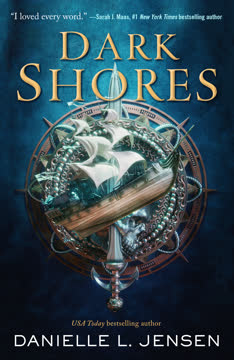Plot Summary
Shores Divided, Secrets Shared
Teriana, a spirited Maarin sailor, and Lydia, a senator's adopted daughter, share a secret friendship in the heart of the Celendor Empire. The Maarin, keepers of the sea's greatest secret—a hidden route across the Endless Seas—are sworn never to reveal the West to the East. But when Lydia's life is threatened by political machinations, Teriana breaks her people's sacred oath, revealing the existence of the Dark Shores. This act of desperate loyalty sets in motion a chain of events that will shatter both their worlds, as the Empire's hunger for conquest is awakened by the promise of new lands.
Empire's Chains, Maarin's Oaths
Teriana's confession to Lydia is not without cost. The Celendor Empire, led by the ambitious senator Lucius Cassius, seizes on rumors of the West, determined to expand its dominion. The Maarin, fiercely independent and bound by ancient oaths, are caught between their lucrative trade with the Empire and the threat of annihilation if their secret is exposed. Teriana's mother, Tesya, the Quincense's captain, is torn between protecting her daughter and her people. Meanwhile, Marcus, the young but battle-hardened legatus of the Thirty-Seventh Legion, is summoned to Celendrial, his fate entwined with Teriana's as Cassius's schemes unfold.
Unlikely Allies, Unforgivable Betrayals
Cassius manipulates both Marcus and Teriana, using blackmail and threats to force their cooperation. Marcus, hiding a dangerous secret about his identity, is compelled to lead the Empire's legions in a campaign to conquer the Dark Shores. Teriana, wracked with guilt and fear for her crew, is forced to guide the Celendor fleet through the treacherous Sea of the Dead. Both are prisoners of Cassius's ambition, their choices shaped by impossible bargains. As the Empire's navy closes in, the Maarin's ancient protections begin to unravel, and Teriana's betrayal threatens to doom her people.
The Consul's Bargain
Cassius's rise to consul is cemented by the coerced votes of Marcus's legion. In exchange for the safety of her mother and crew, Teriana is forced to reveal the Maarin's secret route across the Endless Seas—a path only the gods can open. Marcus, bound by duty and blackmail, must lead his men into the unknown, even as he despises the man who holds his family's fate. The Senate's contract with Teriana is a trap: her people's lives for the conquest of a world. Both Marcus and Teriana are forced to sign away their freedom, their fates now inextricably linked.
The Price of Passage
The Celendor fleet, guided by Teriana and the Maarin, enters the Sea of the Dead, a haunted expanse where the dead outnumber the living. The crossing is only possible with the aid of Magnius, the Quincense's demigod guardian, who demands Marcus's true name as the price for passage. As storms rage and gods battle, the fleet is hurled through a xenthier path—a magical vein that bridges worlds. The journey is harrowing, claiming lives and sanity, and leaves Teriana's soul marked by guilt and forsakenness. Yet, on the far side, the Empire's legions stand ready to conquer the Dark Shores.
Storms, Gods, and Whirlpools
The crossing is not merely a feat of navigation but a trial by the gods. As the fleet is drawn into a supernatural whirlpool, the goddess Madoria and the god Gespurn clash, threatening to destroy all. Teriana, Marcus, and the Maarin crew must rely on faith, courage, and each other to survive. The ordeal forges a bond between Marcus and Teriana, even as it deepens their sense of doom. When the battered fleet emerges on the Dark Shores, the cost of the journey is measured in blood, loss, and the knowledge that the gods themselves are watching.
Blood on the Docks
The Celendor legions land on the coast of Arinoquia, a land fractured by clan warfare and ruled by the tyrant Urcon. Marcus, ever the strategist, forges alliances with local clans, offering to help them overthrow Urcon in exchange for supplies and support. Teriana, forced to translate and negotiate, watches in horror as the Empire's methods—efficient, ruthless, and seductive—begin to win over the Arinoquians. The first taste of conquest is sweet for the legions, but Teriana sees the shadow of the Empire's yoke falling over the West.
The Thirty-Seventh's Dilemma
As the campaign unfolds, Marcus and Teriana are drawn together by shared trauma, mutual respect, and forbidden desire. Both are haunted by the cost of their choices: Marcus by the atrocities of his past and the burden of command, Teriana by the deaths her betrayal has enabled. Their growing intimacy is shadowed by the knowledge that they are enemies, each the instrument of the other's ruin. The legions, meanwhile, are torn between duty to the Empire and the bonds of brotherhood, as the realities of conquest clash with the ideals of home.
Prisoners and Promises
Teriana and her crew are imprisoned, tortured for the Maarin's secrets. Marcus, forced to witness the brutality, intervenes, offering Teriana a devil's bargain: reveal the path to the Dark Shores, and her people will be spared. The price is her soul, her freedom, and the safety of her world. The questioner's mask hides the face of cruelty, but Marcus's own mask is one of necessity. In the darkness of the Empire's dungeons, trust is a currency more precious than gold, and both Marcus and Teriana are forced to gamble everything.
The Questioner's Mask
The questioner's torture pushes Teriana to the edge, her faith in the gods and herself shattered. Marcus, unable to bear her screams, reveals a rare mercy, breaking the cycle of violence but binding her to him with a new kind of chain. The cost of survival is high: Teriana's soul is forsaken, her mother's love lost, and the Maarin's ancient oaths broken. Yet, in the crucible of pain, a new understanding is forged between captor and captive, one that will shape the fate of empires.
Bargains in Blood
The Senate's contract is sealed in blood: Teriana will guide the legions to the Dark Shores, and in return, her people will be spared—if she cooperates. Marcus, ever the tactician, ensures the terms are clear, but both know the bargain is built on shifting sand. As the fleet prepares to sail, Teriana is torn from her crew, forced to spy and sabotage from within. The journey west is a march into the unknown, with every step a reminder of the price of survival.
The Enemy's Embrace
On the far side of the world, Marcus and Teriana's relationship deepens, their shared burdens drawing them together even as their loyalties pull them apart. The campaign against Urcon is swift and brutal, the legions' discipline and Marcus's genius overwhelming the fractured clans. Yet, as victory nears, the cost becomes clear: the Arinoquians are trading one tyrant for another, and Teriana's warnings fall on deaf ears. In the shadows, betrayal festers, and the line between enemy and lover blurs.
Conquest and Consequence
The siege of Aracam, Urcon's stronghold, is the Empire's crowning achievement. Marcus's strategies are ruthless, his resolve unshakable, but the victory is stained with blood and loss. Teriana, forced to witness the consequences of her choices, is wracked with guilt and grief. The Arinoquians, once hopeful, begin to see the true nature of their new overlords. Marcus, haunted by the ghosts of Chersome and the cost of conquest, finds solace only in Teriana's arms—a solace both know cannot last.
The Black Tide Rises
As the legions consolidate their hold, a new threat emerges: Ashok, a corrupted servant of the Seventh god, orchestrates Teriana's abduction with the help of a traitor within the Celendor ranks. The legions are forced to choose between their campaign and the life of the woman who holds the key to their future. Marcus, torn between duty and love, risks everything to save Teriana, even as the shadow of the Seventh god spreads across the land.
The Cost of Loyalty
Teriana's rescue comes at a terrible cost: the revelation of a traitor, the deaths of loyal soldiers, and the knowledge that the gods' war is only beginning. Marcus and Teriana, bound by love and guilt, must confront the reality that their choices have set in motion a tide of darkness that threatens both East and West. The Maarin's ancient oaths, the Empire's ambitions, and the gods' designs converge, leaving no one untouched.
The Traitor's Shadow
The identity of the traitor—whether Felix or Titus—threatens to destroy the fragile unity of the legions. Marcus, forced to choose between justice and loyalty, must confront the consequences of his own secrets. Teriana, caught between her love for Marcus and her duty to her people, faces the ultimate test of faith. As the gods' war looms, the bonds of friendship, family, and love are tested to the breaking point.
The Siege of Aracam
The legions, allied clans, and Maarin face the combined forces of Urcon and the corrupted. The siege of Aracam is a crucible of blood and fire, with victory coming at a staggering cost. Marcus's genius and Teriana's courage turn the tide, but the price is paid in lives, innocence, and the last shreds of hope. The gods' war is only beginning, and the fate of both worlds hangs in the balance.
Love and Ruin
In the wake of victory, Marcus and Teriana confront the reality of their love—a love forged in war, betrayal, and impossible choices. Both are changed, marked by the blood they have spilled and the oaths they have broken. The Empire's conquest of the Dark Shores is only the beginning, and the gods' war threatens to consume all. Yet, in each other, they find a fragile hope—a promise that, even in ruin, love can endure.
Characters
Teriana
Teriana is the second mate of the Maarin ship Quincense and heir to the Maarin Triumvirate. Raised on the sea, she is bold, quick-witted, and deeply devoted to her people and her chosen family. Her forbidden friendship with Lydia leads her to break the Maarin's most sacred oath, setting the story's tragedy in motion. Teriana's journey is one of impossible choices: she is forced to betray her people to save those she loves, and her guilt is a constant companion. Her relationship with Marcus is fraught with tension, desire, and mutual respect, but always shadowed by the knowledge that they are enemies. Teriana's arc is one of sacrifice, resilience, and the search for redemption, as she navigates the treacherous waters of love, loyalty, and survival.
Marcus Domitius
Marcus is the legatus of the Thirty-Seventh Legion, a prodigy of the Empire's military academy, and a man shaped by trauma and secrets. Forced to assume his brother's identity to save his family, Marcus is both a master strategist and a deeply wounded soul. He is blackmailed by Cassius into leading the campaign to conquer the Dark Shores, his every move shadowed by the threat to his family and the ghosts of his past—most notably the atrocities of Chersome. Marcus's relationship with Teriana is transformative: she challenges his certainties, awakens his conscience, and becomes both his greatest weakness and his only solace. His arc is one of self-discovery, as he grapples with the cost of command, the burden of guilt, and the possibility of love in a world that demands sacrifice.
Lucius Cassius
Cassius is the consummate politician, willing to use any means—blackmail, torture, murder—to achieve his goals. His rise to consul is built on the suffering of others, and he is the architect of the Empire's campaign to conquer the Dark Shores. Cassius's manipulation of Marcus and Teriana is central to the plot, and his willingness to break treaties and oaths marks him as a true villain. Yet, his power is always precarious, dependent on secrets and the loyalty of those he cannot fully control.
Tesya
Tesya, Teriana's mother and captain of the Quincense, is a pillar of Maarin tradition. Her devotion to her people and the gods is absolute, and she is devastated by Teriana's betrayal. Tesya's relationship with her daughter is strained by the conflict between duty and love, and her eventual rejection of Teriana is one of the story's most painful moments. Yet, her strength and wisdom remain a guiding force for the Maarin, even in captivity.
Felix
Felix is Marcus's second-in-command and childhood friend. His loyalty to Marcus is fierce, but it is complicated by jealousy—both of Marcus's command and his relationship with Teriana. Felix's actions, whether as traitor or loyalist, are driven by a desperate need for belonging and recognition. His arc is one of internal struggle, as he grapples with the demands of friendship, love, and duty.
Servius
Servius is Marcus's praefectus and closest confidant. He is the emotional anchor of the Thirty-Seventh, providing comic relief, practical wisdom, and unwavering support. Servius's loyalty to Marcus and the legion is absolute, and his compassion extends to Teriana and the Maarin. He is a bridge between worlds, embodying the possibility of understanding and reconciliation.
Yedda
Yedda, Teriana's aunt and first mate of the Quincense, is a source of strength and humor. She is a survivor, unafraid to challenge authority or tradition, and her loyalty to Teriana is unwavering. Yedda's pragmatism and wit provide much-needed levity, even as she navigates the dangers of captivity and war.
Ashok
Ashok is a servant of the Seventh god, a corrupted being who delights in pain and destruction. His abduction and torture of Teriana are acts of both personal malice and strategic sabotage. Ashok embodies the growing threat of the gods' war, his presence a harbinger of the darkness spreading across the world.
Titus
Titus, Cassius's son and legatus of the Forty-First, is both ally and adversary to Marcus. His ambition and resentment simmer beneath a veneer of cooperation, and his role in Teriana's abduction and the campaign's betrayals is ambiguous. Titus represents the dangers of divided loyalty and the ever-present threat of internal sabotage.
Lydia
Lydia, the adopted daughter of Senator Valerius, is the spark that ignites the story's central conflict. Her friendship with Teriana is genuine and deep, but her vulnerability makes her a pawn in the Empire's games. Lydia's fate is a constant source of fear and motivation for Teriana, and her presence haunts the narrative even in absence.
Plot Devices
Dual Protagonists and Alternating Perspectives
The novel's structure alternates between Teriana and Marcus, allowing readers to experience the story from both sides of the cultural and moral divide. This device deepens empathy, complicates notions of right and wrong, and heightens the emotional stakes. The dual perspective also enables the gradual revelation of secrets, motivations, and betrayals, building tension and suspense.
Oaths, Contracts, and the Weight of Promises
The plot is driven by a series of oaths and contracts—Maarin vows, Senate bargains, and personal promises. These binding agreements are both literal and symbolic, representing the inescapable consequences of choice. The breaking and keeping of oaths shape character arcs, drive conflict, and underscore the novel's central theme: that freedom is always bought at a price.
Gods, Magic, and the Supernatural
The presence of gods, demigods, and magical paths (xenthier) elevates the stakes from political to cosmic. The gods' war, the power of the corrupted, and the Maarin's relationship with their guardians blur the line between fate and free will. Supernatural elements are used to foreshadow coming conflicts, symbolize internal struggles, and force characters to confront forces beyond their control.
Betrayal and the Unreliable Ally
The novel is rife with betrayals—personal, political, and spiritual. Allies become enemies, friends become traitors, and every act of trust is fraught with risk. The device of the hidden traitor (Felix or Titus) keeps both characters and readers off-balance, while the shifting alliances between Marcus, Teriana, and their respective peoples create a constant sense of danger and uncertainty.
Moral Ambiguity and the Cost of Survival
The narrative structure refuses easy answers or clear-cut heroes. Every victory is tainted, every act of mercy has a price, and every character is forced to choose between bad and worse. The use of parallel arcs—Marcus's haunted past and Teriana's guilt—reinforces the theme that survival often demands the sacrifice of innocence, and that love can be both a salvation and a ruin.
Analysis
is a sweeping epic that interrogates the cost of empire, the burden of oaths, and the possibility of love across irreconcilable divides. Danielle L. Jensen crafts a world where every choice is a betrayal, and every act of loyalty is a double-edged sword. The novel's greatest strength lies in its refusal to offer easy answers: Marcus and Teriana are both victims and agents of their own ruin, their love forged in the crucible of war and guilt. The story's use of dual perspectives, moral ambiguity, and supernatural stakes elevates it beyond standard fantasy fare, inviting readers to question the nature of power, the meaning of freedom, and the limits of forgiveness. Ultimately, Dark Shores
is a meditation on the price of survival—personal, cultural, and cosmic—and a testament to the resilience of hope, even in the face of inevitable loss.
Last updated:
Review Summary
Dark Shores received mixed reviews, with many praising its Roman-inspired world-building, political intrigue, and complex characters. Readers enjoyed the enemies-to-lovers romance between Teriana and Marcus, though some found it forced. The plot's pacing and action sequences were well-received, but some felt misled by marketing that suggested more pirate content. Critics noted underdeveloped world-building and characters in places. Overall, most reviewers found it an engaging start to the series, with interesting themes of conquest and morally gray choices, despite some flaws.









